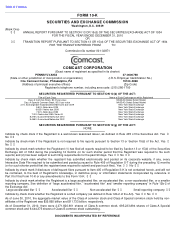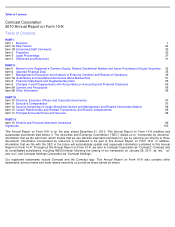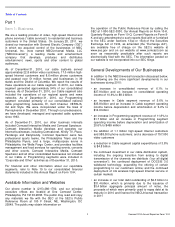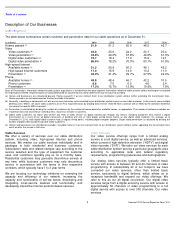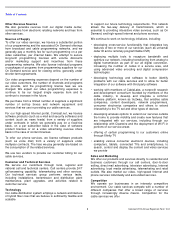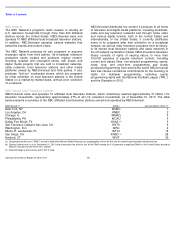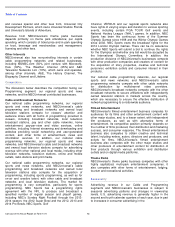Comcast 2010 Annual Report Download - page 11
Download and view the complete annual report
Please find page 11 of the 2010 Comcast annual report below. You can navigate through the pages in the report by either clicking on the pages listed below, or by using the keyword search tool below to find specific information within the annual report.
Table of Contents
7
Comcast 2010 Annual Report on Form 10-
K
Other Wireline Providers
Federal law prohibits franchising authorities from
unreasonably denying requests for additional franchises, and
it permits franchising authorities to operate cable systems. In
addition to phone companies, various other companies,
including those that traditionally have not provided cable
services and have substantial financial resources (such as
public utilities, including those that own some of the poles to
which our cables are attached), have obtained cable
franchises and provide competing cable services. These and
other cable systems offer cable services in various areas
where we hold franchises. We anticipate that facilities
-based
competitors may emerge in other franchise areas that we
serve.
Satellite Master Antenna Television Systems
Our cable services also compete for customers with SMATV
systems. SMATV system operators typically are not subject
to regulation in the same manner as local, franchised cable
system operators. SMATV systems offer customers both
improved reception of local television broadcast stations and
much of the programming offered by our cable systems. In
addition, some SMATV system operators offer packages of
video, Internet and phone services to residential and
commercial developments.
Other Competitors
Our cable services also may compete to some degree for
customers with other companies, such as:
High-Speed Internet Services
We compete with a number of companies offering Internet
services, many of which have substantial resources,
including:
•
online services that offer Internet video streaming and
distribution of movies, television shows and other video
programming
•
local television broadcast stations that provide multiple
channels of free over-the-air programming
•
wireless and other emerging mobile technologies that
provide for the distribution and viewing of video
programming
•
video rental services and home video products
•
wireline phone companies
•
Internet service providers
•
wireless phone companies and other providers of wireless
Internet service
•
power companies
Digital subscriber line (“DSL”) technology allows Internet
access to be provided to customers over phone lines at data
transmission speeds substantially greater than those of dial-
up modems. Phone companies and certain other companies
offer DSL service, and several of these companies have
increased transmission speeds, lowered prices or created
bundled service packages. In addition, some phone
companies, such as AT&T and Verizon, have built and are
continuing to build fiber-optic-based networks that allow them
to provide data transmission speeds that exceed those that
can be provided with DSL technology and are now offering
these higher speed services in many of our service areas.
The FCC has reduced the obligations of phone companies to
offer their broadband facilities on a wholesale or retail basis
to competitors, and it has freed their DSL services of
common carrier regulation.
Various wireless companies are offering Internet services
using a variety of types of networks, including 3G and 4G
wireless high
-speed data networks (which employ LTE,
WiMax and other technology standards) and Wi-Fi Internet
networks. These networks work with devices such as
wireless data cards and wireless embedded devices, such as
handsets, laptops and tablets. Some of these services are
similar to ours. In addition, a growing number of commercial
venues, such as retail malls, restaurants and airports, offer
Wi-Fi Internet service. Numerous local governments are also
considering or actively pursuing publicly subsidized Wi-Fi and
other Internet access networks.
Phone Services
Our phone services compete against wireline phone
companies, including competitive local exchange carriers
(“CLECs”), wireless phone service providers and other VoIP
service providers. Certain phone companies, such as AT&T
and Verizon, have substantial capital and other resources,
longstanding customer relationships and extensive existing
facilities and network rights-of-way. A few CLECs also have
existing local networks and significant financial resources.
Advertising
We compete for the sale of advertising against a wide variety
of media, including local television broadcast stations,
national television broadcast networks, national and regional
cable programming networks, local radio broadcast stations,
local and regional newspapers, magazines and websites.


